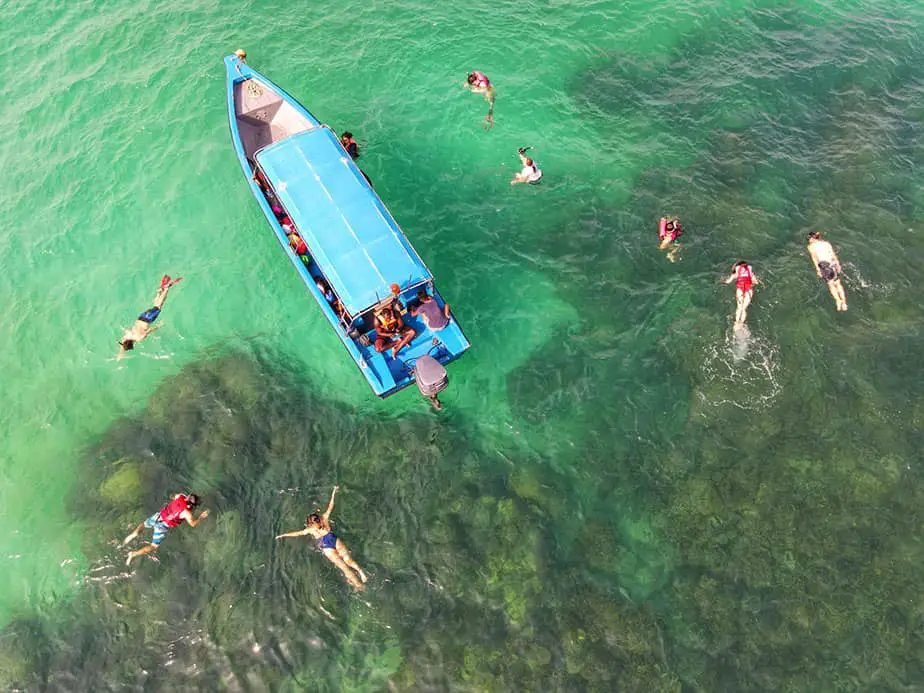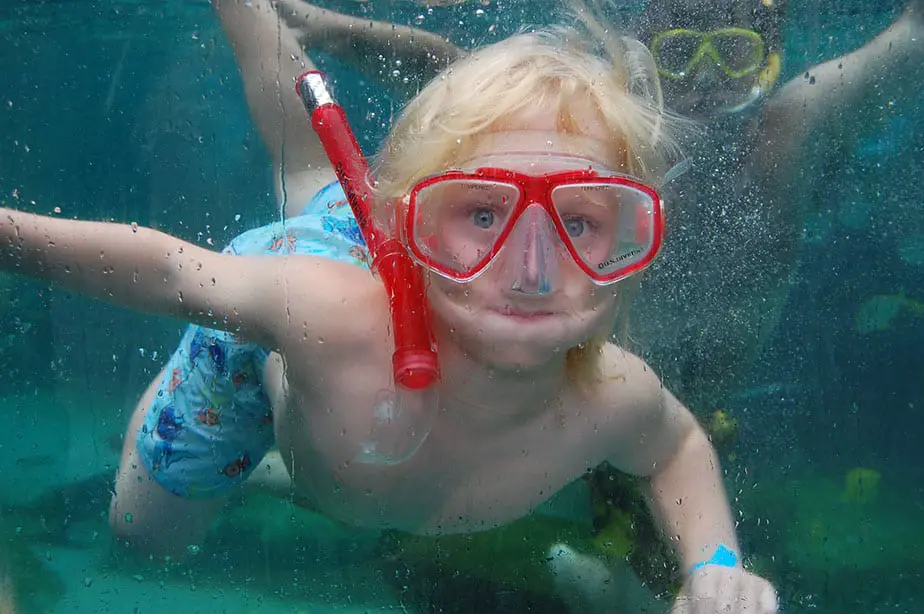When you’re vacationing on a tropical island and are looking to view the aquatic life in the ocean, the two most popular options available are snorkeling or scuba diving. Both of these sports are considered recreational activities. However, there are some major differences between them such as how much training you need, cost, and how long you can stay underwater for.
Snorkeling has a lower barrier-to-entry and you can easily enjoy this activity with the whole family. All you need are some basic swimming skills, a mask, and a snorkel, all of which are easily attainable. Scuba diving requires expensive, complex equipment and a scuba diving certification. These are necessary because you will be diving dozens of feet underwater, and this poses many safety risks that you should be prepared for.
Both sports have their pros and cons, and one is not necessarily better than the other. If you’re not willing to invest as much effort and money, snorkeling is the clear winner. Scuba diving requires a greater time and financial investment, but there are also one-off scuba tours that don’t require a license. In this article, we will go over the differences between these sports to help you pick which one is better suited for you.
What is snorkeling?
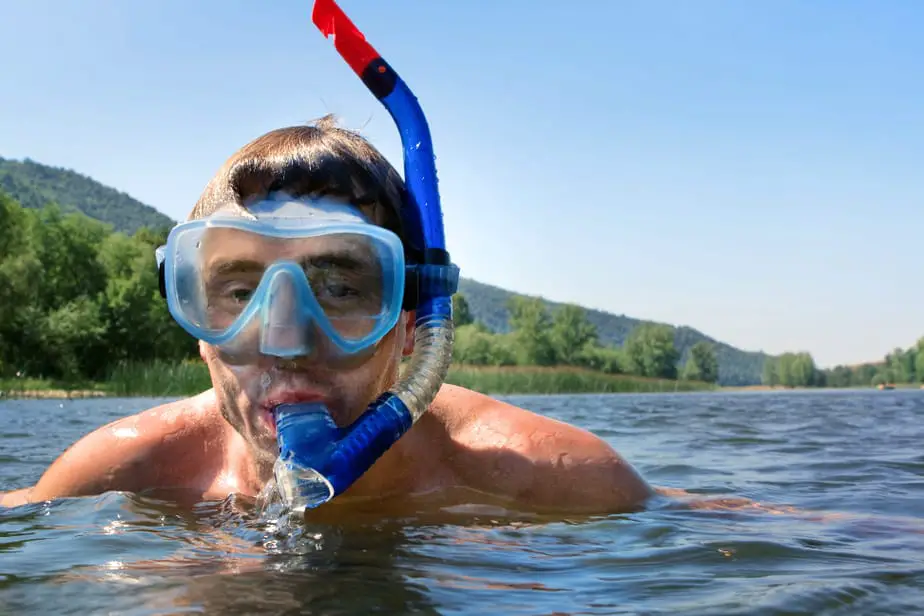
How does snorkeling work? Snorkeling is done by floating or swimming along the surface of the water with the face submerged underwater while breathing through the snorkel. This activity lets you observe the coral reefs, fish, and marine plants without needing to surface for air.
It is best to wear a flotation device so that you don’t waste energy trying to stay afloat, allowing you to snorkel for a longer time. Some advanced snorkelers will even dive down to get a closer look at something or will be actively spearfishing while snorkeling.
Almost anyone can snorkel. You don’t even necessarily need to know how to swim, though it is highly recommended. You can snorkel from the shore or from a boat, and it is recommended you stay with a group.
What is scuba diving?
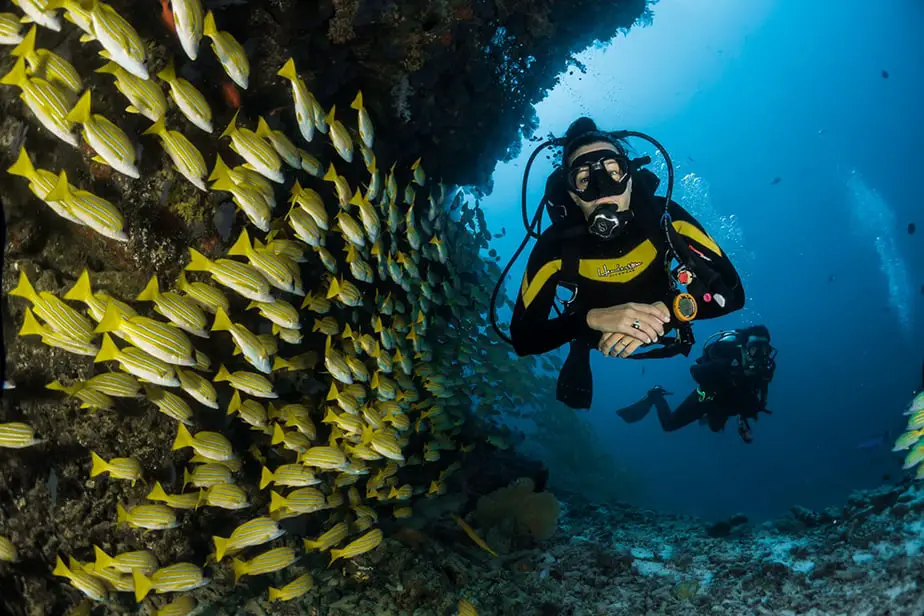
SCUBA stands for self-contained underwater breathing apparatus, and scuba diving is the act of using scuba gear to breathe underwater. Scuba diving allows divers to safely dive dozens of feet down so that they can explore places that they couldn’t normally reach while holding their breath.
While underwater, in addition to observing fish and corals, divers can also explore caves and wrecks. While scuba diving is typically done as a recreational activity, there are commercial divers who make a living from it. Some careers include underwater welding, offshore construction, marine biologist, civil engineering, scuba instructor, and military diving operations.
You cannot scuba dive without the proper equipment, and you must first take a course in order to learn how to use the equipment. Scuba diving can be done from a boat or from the shore, and is usually done in groups.
Required training
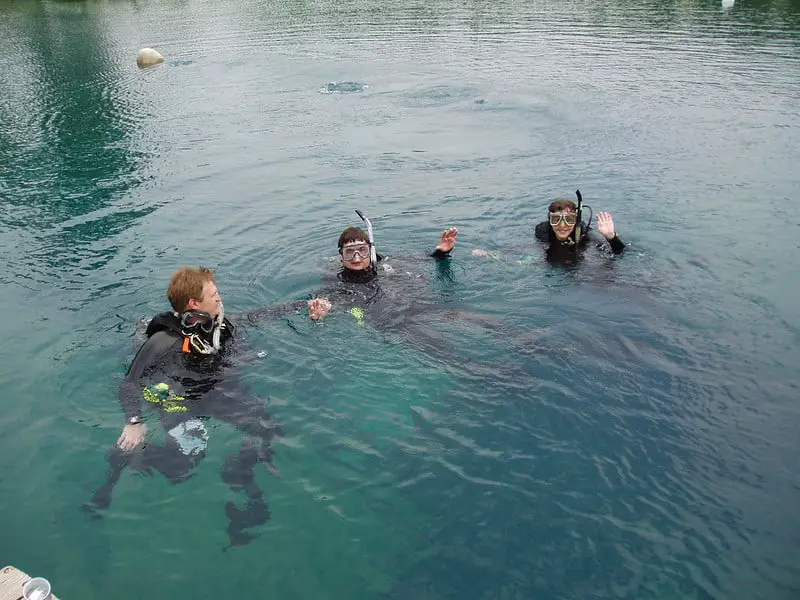
Snorkeling does not require any training or certifications for one to get started. With that said, it is highly recommended that you know how to swim. If you are not confident in your swimming skills, we recommend you take some swimming courses because it can improve your snorkeling experience and possibly save your life in an emergency.
Furthermore, snorkelers owe it to themselves to learn about best practices. Over the years, many tropical destinations are suffering record losses in marine life and destruction of habitat because of the tourism industry. Many snorkelers are unaware that their sunscreen is actually toxic and washes off into the water. They may also damage coral by accidentally kicking them or covering them in sand.
On top of that, if a snorkeler lacks swimming ability, knowledge of currents, and general common sense, then they are putting their life at risk. Even though there is no required training, you should still read some snorkeling guides before you head out.
Scuba divers must pass an Open Water course in order to receive a certification. There are ways you can scuba dive without a license, such as if you take a one-day course or you SNUBA dive. If you want to scuba dive recreationally, however, then you must be certified.
During the training, you will learn the basics such as how to use your gear and how to avoid decompression sickness. First, there is the knowledge portion where you must study from a textbook. Then there is the hands-on portion where you will first be learning how to use the gear in a shallow pool, then you must successfully complete 4 dives in the open water.
Once certified, you are certified for life. If you got certified years ago and have forgotten most of the basics, you can take a refresher course to get up to speed. You must present your certification card to dive operators, rental shops, and dive shops before you can rent or purchase gear or go diving.
Overall, the scuba certification will cost you anywhere from $300 to $700 depending on where you decide to perform the 4 open water dives. It should also take approximately 16-32 hours of your time.
Age limits
There is no minimum age for snorkeling. Parents have taken their children as young as 5 years old snorkeling. The limiting factor is not so much age as swimming ability and how comfortable a child feels in the water. To alleviate some worry, young children should wear a life jacket.
Some snorkel operators will increase the age limit at their discretion if the weather conditions are not safe. It is recommended that kids snorkel in shallow waters, such as by the shore or in a confined area where there are no currents.
Many scuba diving training agencies have set the minimum age requirement to take their Open Water course to 10 years old. From ages 10-15 years old, young divers can earn their Junior Open Water certification. After they are at least 16 years of age, they can obtain their regular Open Water certification by getting some additional training.
PADI’s Bubblemaker program lets kids as young as 8 years old learn about scuba gear and take their first breaths underwater in a pool that is only 2 meters (6 feet) deep.
Fitness to snorkel or dive
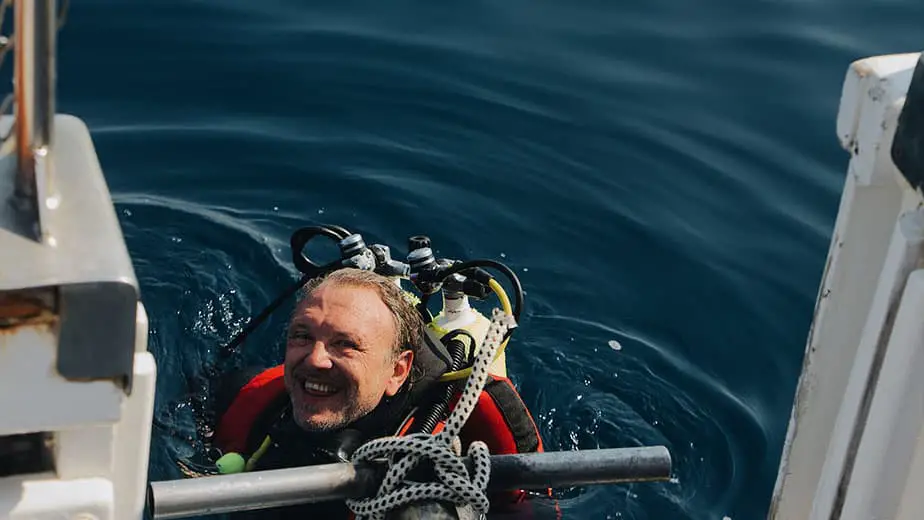
While snorkeling is a relaxing activity, it is recommended that snorkelers have good cardiovascular health. You never know when the currents might sweep you away or make it difficult to return to the shore or the boat. Snorkelers who want to dive down should be confident in their breath-holding skills.
Since snorkeling is done by the water’s surface, and with the help of a flotation device, is not the most strenuous device, a greater number of people can safely snorkel. The requirements for scuba diving, for example, are much stricter because of the various health risks that diving deep can pose.
Scuba diving puts a significant strain on the body. As a diver descends, the water pressure will act on the body and compress the air inside the lungs. This makes it harder to breathe, and if you have asthma, can be very dangerous if you suffer an attack underwater. People with heart and lung conditions may not be fit for diving because they will find it hard to breathe.
Before each dive course, students fill out a medical questionnaire. If you have a history of medical conditions, consult with a doctor, preferably a diving doctor, who can determine if you are medically fit to dive. Suffering a medical emergency while underwater is almost always fatal, so the health standards for diving are significantly higher.
Equipment differences
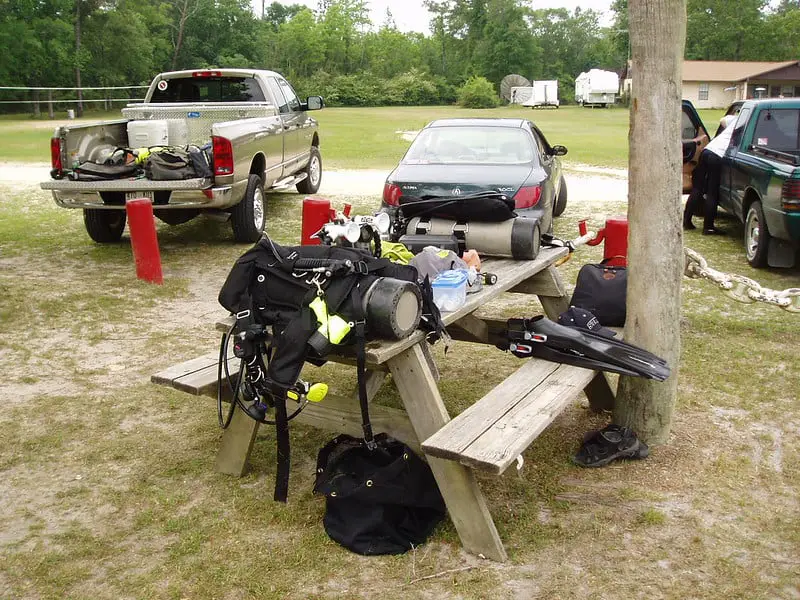
Snorkeling gear is very basic and affordable. All you technically need are just the mask and snorkel. A recent innovation, the full face snorkel mask, combines the mask and snorkel into one product. Some optional but highly recommended snorkeling gear are fins, a snorkel vest, and a rash guard. You can purchase all of these for around $100 to $200 total.
Scuba diving requires much more gear than snorkeling and requires special training in order to use them properly. The basic requirements are:
- Dive mask
- Dive fins/gloves/hood
- Scuba tank
- Two-stage regulator
- Wetsuit or drysuit
- Dive computer
- Submersible pressure gauge (SPG)
- Buoyancy compensator (BC)
As you can imagine, traveling with all of this gear is not very feasible. Unless you are lucky enough to live in a tropical destination, most divers will rent their gear. The cost of owning a full set of scuba gear is very expensive, ranging from $2,000 at the low end to $5,000 or more at the high end.
Breathing differences
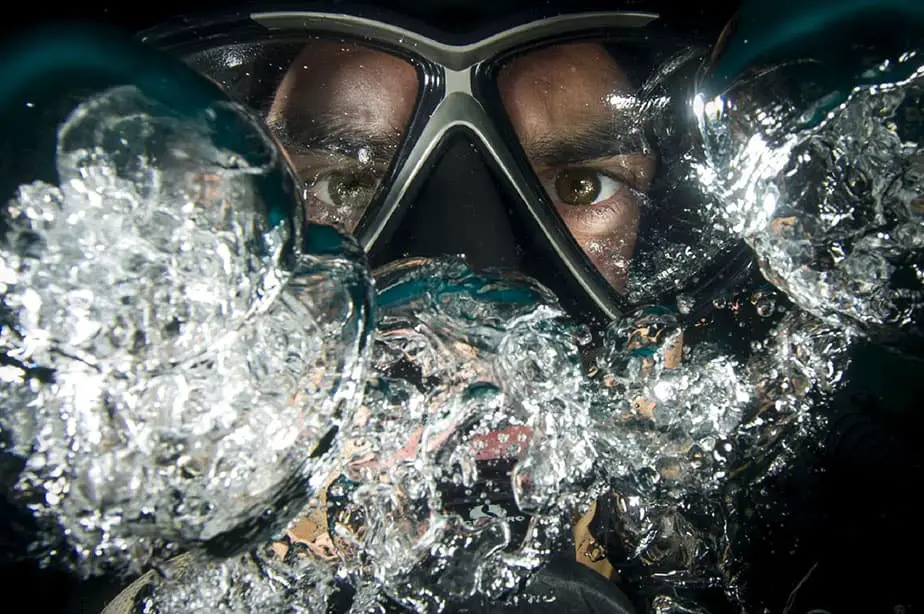
Snorkelers breathe using a snorkel tube. The tube must be kept above the water’s surface in order to access the fresh air. For the best results, snorkelers should take large breaths so that air can flow all the way through the tube. Short breaths are discouraged because it can lead to dead air in the tube.
There are various types of snorkels – the classic “J” snorkel which has an open top, a semi-dry snorkel which has a splash guard, and a dry snorkel which has a splash guard and a float valve. In an open top snorkel, water can enter and easily cause choking. Snorkels with a splash guard keep splashes of water out, however it will still let water in if submerged. Dry snorkels will automatically seal the top if it is submerged, preventing water from entering.
Scuba divers get their air supply from their scuba tank. They breathe using a regulator, which depressurizes the gas from the tank so that it reaches ambient pressure which can be safely inhaled by the diver. Scuba divers should also perform full inhales and exhales in a calm and controlled manner. One important rule is that divers should never hold their breath, especially if they are ascending to prevent lung overexpansion injuries.
Depth differences
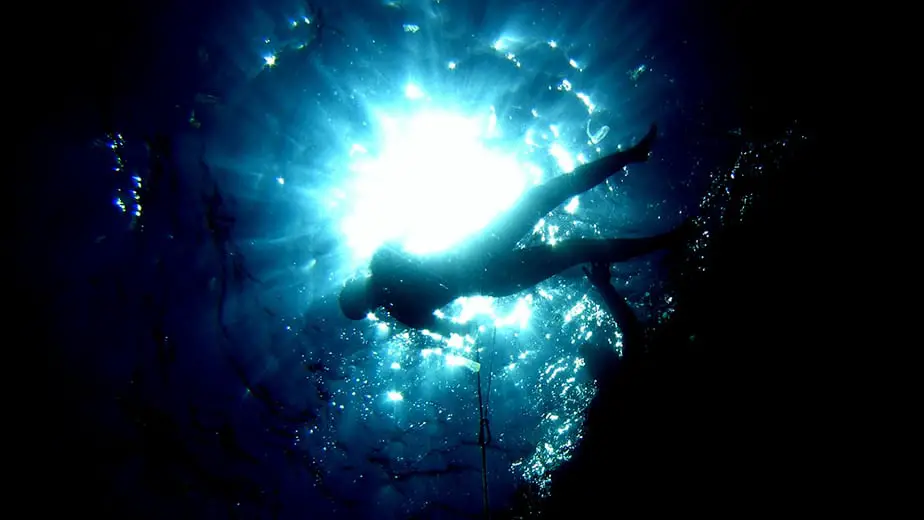
Snorkelers will spend most of their time floating at the surface. They cannot dive too far because the snorkel tube will be submerged, cutting off their supply of fresh air. While snorkelers can see plenty of fish and coral from the surface, if they were able to dive down, they could see even more. In fact, snorkelers can and do dive down to get a closer look, but they are limited to the oxygen in their lungs.
If you want to dive deep underwater and explore the ocean, then scuba diving is the superior choice. You can basically dive as deep as your training, equipment, and certification allows you to. Recreational divers have a limit of 40 meters (130 feet), while technical divers can reach 60 meters (200 feet).
The deeper one dives, the more risks there are. For instance, the chances of getting decompression sickness drastically increases, the effects of nitrogen narcosis are greater, and your gas supply will not last as long.
Time spent underwater
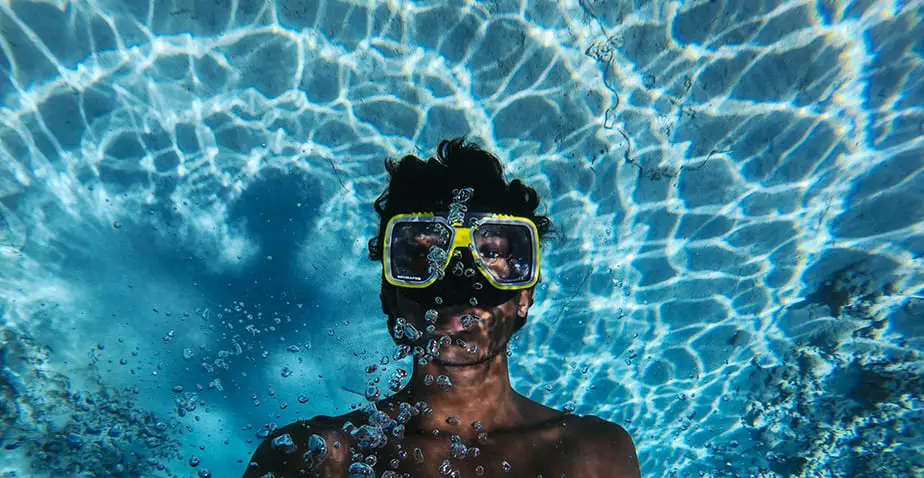
You can spend a long time at the surface of the water if you’re snorkeling. Snorkelers may occasionally need to surface to recover their breath, because breathing through a snorkel is tougher than normal plus CO2 may slowly build up in the tube.
Scuba divers can stay underwater for as long as they still have gas in their tank. There are many variables which influence how long a scuba tank lasts. For instance, men have larger lungs than women and will use up their air faster. People who are out of shape will breathe heavily and surface faster than fit individuals.
There is also the consideration of the capacity of the scuba tank and the depth the diver will reach. A larger tank can hold more air so it will last longer. Divers can also dive with more than one tank. Furthermore, the deeper the depth, the faster the air gets used up because it is compressed. Divers are taught to surface when the tank still has 500 PSI or 50 bar of gas left.
In general, a 3000 PSI tank used at a depth of 30 feet can probably last for around 45 to 60 minutes. A dive computer may also warn a diver to return to the surface if they have too much nitrogen in their system and they need to decompress.
Risks and dangers
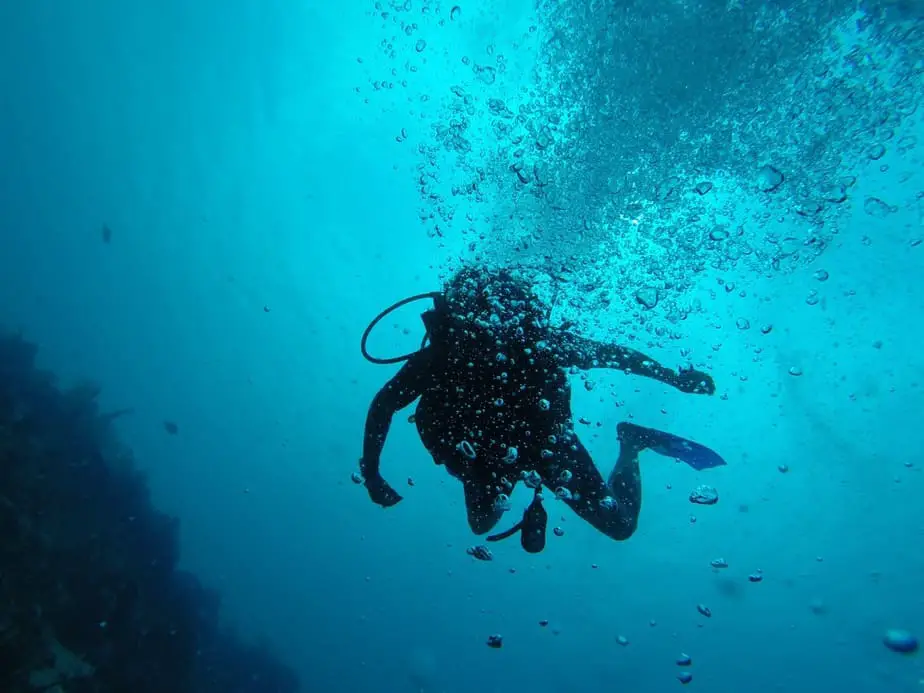
Out of these two activities, snorkeling is by far the safer option. Some risks to be aware of when snorkeling are jellyfish stings, boats or jet skis, sharp coral and rocks, getting sunburned, riptides, and swimming too from the shore/boat without realizing it. There is also the risk of drowning if you panic or aren’t wearing a flotation device.
On the other hand, scuba diving is comparatively more dangerous than snorkeling despite it being a safe recreational activity as well. The biggest danger for scuba divers is decompression sickness which occurs when a diver surfaces too quickly without decompressing.
There is also the risk of equipment malfunction, such as regulator failure or a faulty dive computer. You should not go scuba diving if you have heart or lung problems. Never hold your breath while diving. Doing multiple dives in a day with too short of a surface interval increases the chances of decompression sickness.
After scuba diving, it is not recommended to go to a higher elevation until 18 to 24 hours have elapsed. In other words, do not go up a mountain or board any aircraft. The increased elevation can once again put you at risk of decompression sickness. Snorkelers do not have this limitation and are free to do whatever they want after a snorkeling session.
Snorkeling vs. scuba diving – which is the better option?
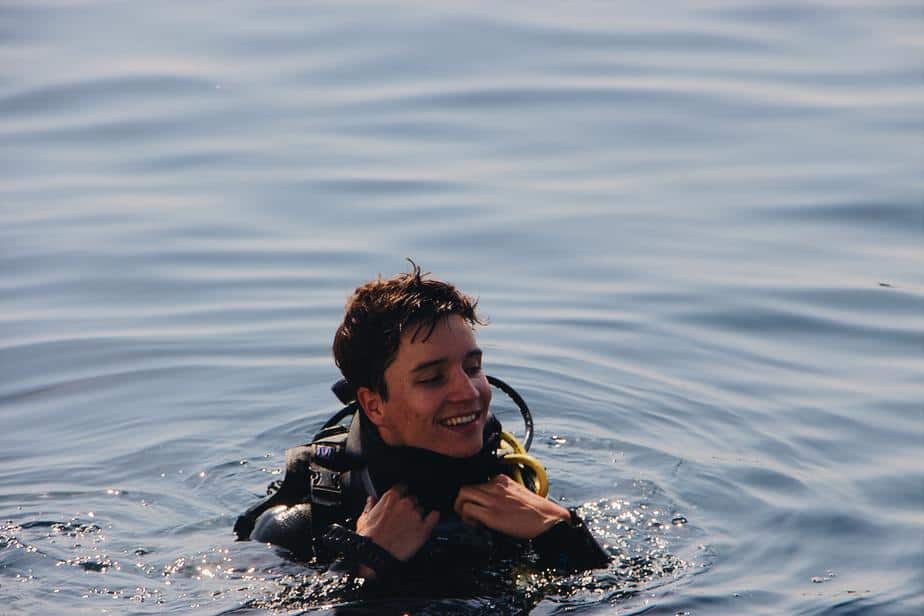
Asking if snorkeling is better than scuba diving is like asking if football is better than soccer. Both are great sports that have a lot of similarities but also a lot of differences. It also depends on what you want out of the activity and how much you are willing to invest to make it work.
Snorkeling is the more accessible hobby. It requires no certification, training, and very little financial cost. The whole family can easily start snorkeling as long as everyone is comfortable in the water. You can get a glimpse of the underwater world by snorkeling at the surface, and for most people, this is enough.
Scuba diving lets you dive deeper and stay underwater for much longer. However, it requires getting certified, expensive gear, and is less family-friendly. The risks of scuba diving are also a lot higher, but the rewards are greater. There are some fish and marine life that can only be found at depths that snorkelers cannot reach. Furthermore, scuba divers can explore caves and wrecks, though that requires more training.
Both snorkeling and scuba diving cater to different people, and you should pick the option that is most convenient for you. Furthermore, snorkeling can be a great stepping stone to scuba diving in the future. Both are great and have their advantages.
You might also be interested in reading our articles on the differences between freediving vs. scuba diving and freediving vs. snorkeling.
Photo Credits: Greg Grimes from flickr CC-BY SA 2.0

